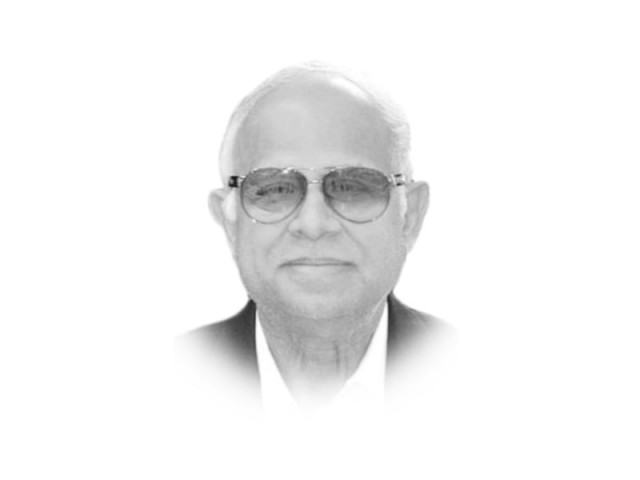Blindly following the Constitution
Can one give blind adherence to the Constitution when camouflage of democracy is used for criminalising society?

Just before the dharnas commenced in August 2014, the National Assembly speaker appointed a 33-member (including 11 senators) Parliamentary Committee for Electoral Reforms in consultation with the senate chairman “to evaluate the shortcomings in the present electoral process and make recommendations thereof to hold free, fair and transparent elections”, tacitly accepting that the electoral system as flawed. Meeting recently for the ninth time chaired by Finance Minister Ishaq Dar, men of some substance were appointed to a subcommittee mandated to come up with definitive recommendations.
If the subcommittee abandons the ‘filibuster’ mode, some reforms are easy. Indirect elections to the Senate, our ‘democratic’ version of the British House of Lords, is a shameful disgrace. The ‘auction’ for senate seats in some cases an insult to the name of democracy. ‘Majority Vote’ and ‘proportional representation’ are the basic requisites of any democracy. Without 50 per cent plus one vote, giving absolute majority in any constituency, run-off elections between the first two candidates and proportional representation are necessary mechanisms to unite the community in countries beset with religious, sectarian and ethnic schisms.
Impacting beyond the boundaries of a single society, sociopolitical issues require ethical and responsible solutions. National security can be undermined if an adverse sociopolitical environment prevails over values, ideology, economy and the decision-making process. The government’s constitutional obligation to correct socio-economic inadequacies fails when the mechanism for administration and law enforcement is diverted for crass political motives. Those fixated on making money for themselves will invariably manipulate the system to enhance their own rule by delaying the reforms process. Endemic bad governance endangers the state and adversely affects the safety, comfort and welfare of the people. Without a transparent and effective electoral system, honest and capable leaders will never emerge.
Plenty of rhetoric about morality notwithstanding, nations and individuals are selective about applying their conscience. The US would normally condemn it as being morally repugnant in other cases what it accepts as civilian collateral damage in its own offences. The necessity for holding the perpetrators of the 9/11 atrocity accountable overrides such qualms. Applying the ‘doctrine of necessity’ for taking the evil out from its roots makes it justifiable under Justice Oliver Wendell Holmes’s concept of combatting “clear and present danger”, correctly inculcating the spirit of the law rather than blindly adhering to its wording. Similarly, can one give blind adherence to the Constitution when the camouflage of democracy is used to deliberately criminalise society? Is it not only dishonest to take refuge in verbatim interpretation of the words of the Constitution but cowardly, too, as one’s duty and obligation is to do what is morally right for the nation and its people.
Listen not to Imran Khan but the former chief justice of Pakistan, Iftikhar Chaudhry, asking the students of the National Management Center in mid-2013, “Do we reward merit and hard work? Are the term’s principles of the rule of law and the supremacy of the Constitution being strictly enforced? Do the citizens of the country trust the system and think it provides them fair opportunity to realise their dreams in a transparent manner? Does the present system have the capacity to discourage the corrupt? Do we have a system where civil and property rights are protected and contracts are fully enforced? The answer to the above questions is no, the system is distorted and does not provide a level playing field to the people to achieve in life whatever they are capable of.”
How does the military interpret ‘aid to civil power’ when mob violence makes it impossible for civilian rule to function? In such a case, it readily accepts power as a necessary tool to restore the rule of law.
Derived from the 1776 US Declaration of Independence (holding true for all democracies everywhere), the First Amendment to the 1789 US Constitution states: “Whenever any form of government becomes destructive of these ends, it is the right of the people to alter or to abolish it, and to institute a new government, laying its foundation on such principles and organising its powers in such form as to them shall seem most likely to effect their safety and happiness.”
When bad governance makes democracy delusional, applying common-sense logic to conscience someone must find the moral courage to cross the hypothetical fail-safe line to save the country from the predators in control!
Published in The Express Tribune, November 13th, 2014.
Like Opinion & Editorial on Facebook, follow @ETOpEd on Twitter to receive all updates on all our daily pieces.















COMMENTS
Comments are moderated and generally will be posted if they are on-topic and not abusive.
For more information, please see our Comments FAQ